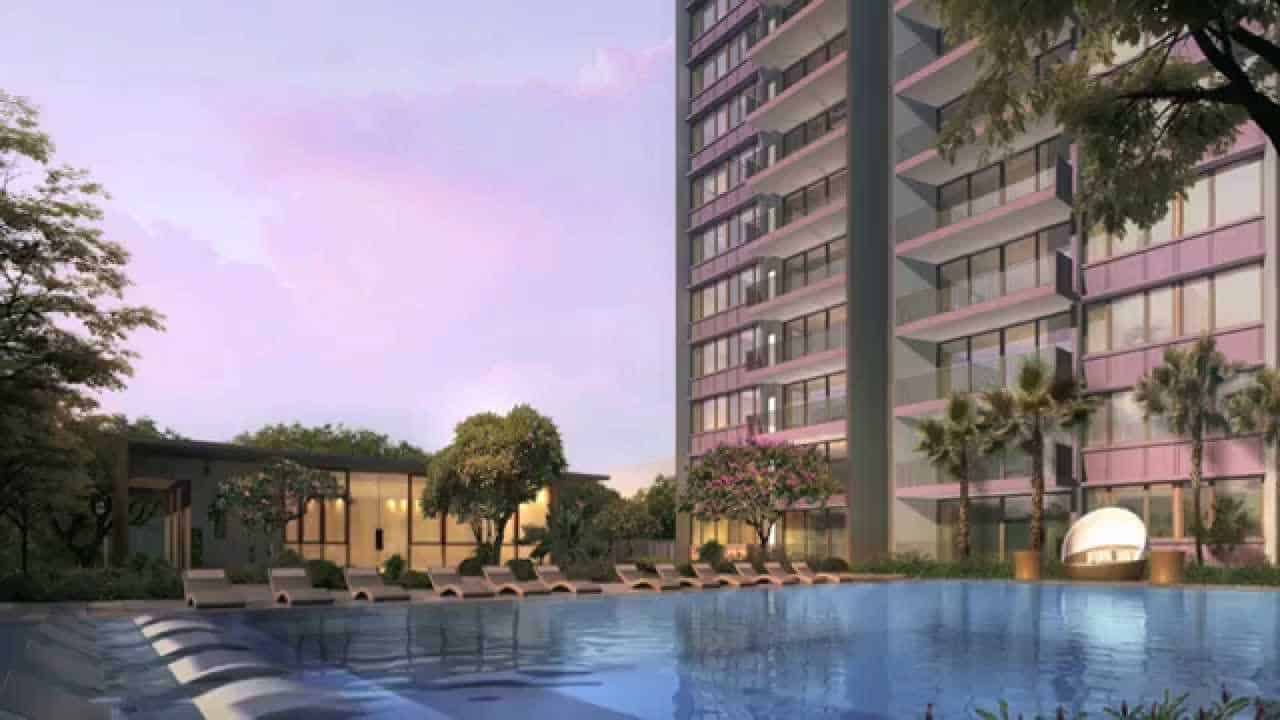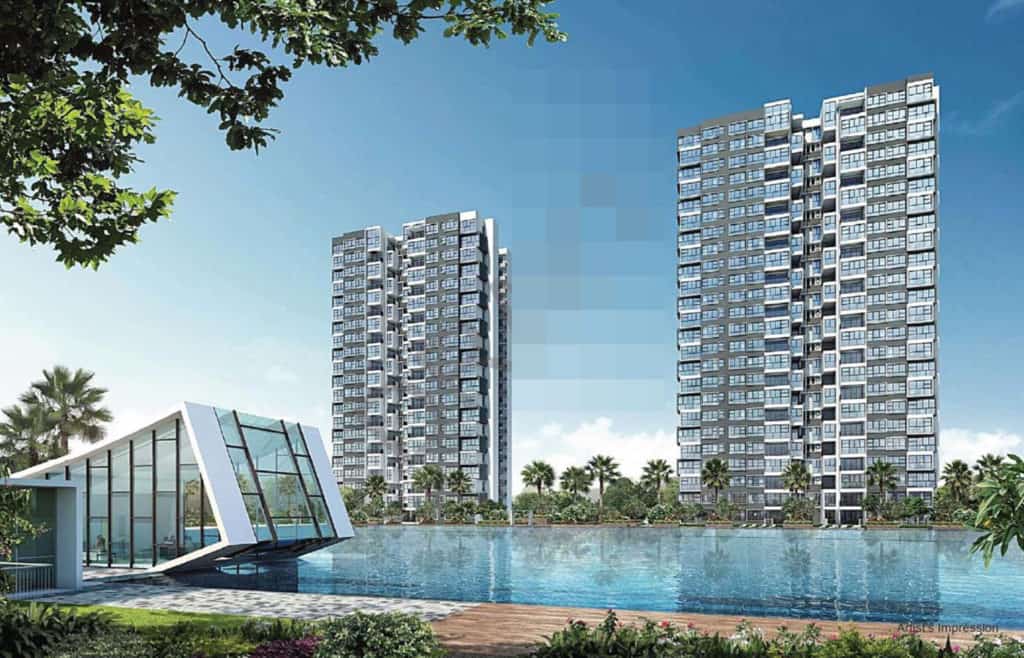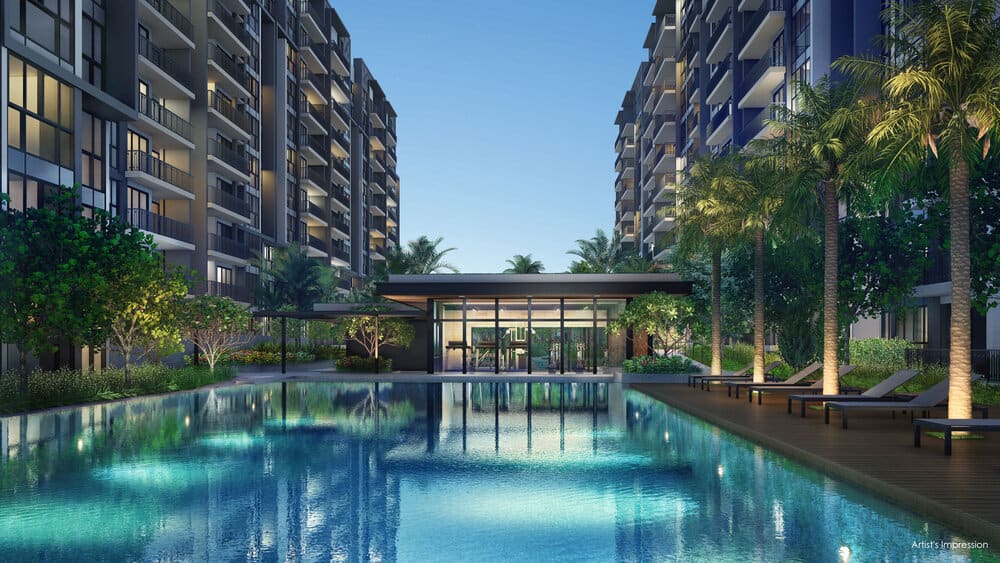Executive Condominiums

Known as the “sandwich flat”, an EC is a public-private housing hybrid tailored for middle-income Singaporeans who don’t qualify for a HDB flat owing to the income ceiling restriction, but still deem private condos too pricey.
ECs are created and marketed by private developers but are financed by the government. This means they offer condo-type amenities like gyms, clubhouses, and swimming pools, yet they are less expensive than private condominiums. To paraphrase the previous National Development Minister Khaw Boon Wan, it’s like purchasing a Lexus for the price of a Toyota Corolla.
The flip side of being a hybrid development though, is that ECs are deemed HDB properties for the first 10 years, which means they’re confined by HDB’s laws. These include the 5-year Minimum Occupancy Period (MOP) regulation, HDB’s numerous qualifying programmes, HDB’s selling limitations and the resale charge (if you’re purchasing it from a developer).
ECs, on the other hand, will be privatised after their 11th year, at which point they will be more valuable since they may be sold to a wider range of bidders.

Pros:
New ECs Are Eligible for CPF Housing Grants (First-Time Buyers Only) (First-Time Buyers Only)
One of the wonderful things about purchasing a new EC, is that you’re eligible for CPF Housing Grants, which may assist to offset part of the expense. There are two kinds of funding available for ECs:
- In-Law Subsidy
- Grant for a Half-House
The biggest caveat (other than being a first-time buyer) is that your gross monthly income needs to be $14,000 and lower. Other considerations include your country of residence, your co-status applicant’s as a first-time or repeat applicant, and your financial situation.
Executive Condos Are Cheaper Than Private Condos
Isn’t it true that everyone loves getting a deal on things?
When you purchase an executive condo, you’re getting a condo that is subsidised by the government. This means you’ll save a little money, but you’ll also get access to condo amenities like swimming pools, tennis courts, BBQ pits, meeting spaces, and gyms, all at a lower price. ECs also come with fully equipped kitchens and bathrooms, as well as finishings that are equivalent to private condominiums.
On top of that, you may also take use of the CPF Housing Grants mentioned previously, which are beneficial to help offset the cost.
ECs Become Privatised After the 10th Year, Affordability Is a Strength
Sure, the first 10 years could be a bit of a drag, but after the 5-year MOP period is done, you can sell it (only to SCs or PRs), or rent it out.
It will be possible to sell an EC to a foreign buyer after the 11th year.
ECs also tend to appreciate in value over time. Remember that when you purchase an EC, you’re purchasing at a reduced price. In contrast to resale condominiums, however, the capital gains are often bigger if the property reaches the MOP and the 11th year.
ECs Are a Good Option for Middle-Income Singaporeans
With an average gross monthly family income ceiling of $16,000 (which was increased from $14,000 before), ECs are more desirable to middle-income Singaporean families who can’t afford BTO apartments owing to the income restriction. Because of the $7,000 income restriction, singles who cannot ‘afford’ BTO apartments may be interested in ECs.
ECs Are Designed for Own-Stay Purposes
Because of the qualifying requirements, ECs are aimed at owner-occupiers (buyers who own and live in the property), which is somewhat different from private condominiums, since it draws investors as well. Since private condominiums typically start at one bedroom, ECs often start with three-bedroom apartments.
As such, not only are EC apartments normally larger than private condos, but the population mainly comprises of local families, although private condominiums are more diversified.

Cons:
1. ECs must follow HDB regulations for a period of ten years.
In the first decade, ECs are treated as HDB homes, as previously stated. HDB regulations, such as the five-year MOP (Housing Development Board Minimum Occupancy Period), require you to live in your property for this time period before you may sell or rent it out (only to SCs and PRs). Note that the MOP term only starts after the development gets its Temporary Occupation Permit (TOP) (TOP).
Apart from that, you’ll also need to fulfil the other requirements, including the income ceiling limit, the property ownership rule, resale levy rule, and the numerous qualifying conditions (see below) (see below).
2. Executive Condos Are Mostly Located in ‘Ulu’ Locations
Low-cost land is required for the construction of ECs in order to keep their prices low. So it’s no surprise that most of Singapore’s ECs are in outlying areas such as Sengkang, Punggol, Woodlands, and Sembawang. Apart from that, most ECs aren’t ‘near’ to MRT stations or bus interchanges either.
3. You Can Only Apply for a Bank Loan
That’s accurate, ECs aren’t eligible for HDB loans. This implies you need to secure a loan from a bank or financial organisation.
A bank’s loan-to-value ratio (LTV), as opposed to a HDB loan, is 75 percent of the property’s worth or price, rather than 50 percent (whichever is lower).
This implies that a down payment of at least 25% must come from your own resources. Out of this, 5 percent must be paid in cash, while the remaining 20 percent might be a mix of CPF and cash. So, if you’re purchasing an EC for $1 million, for example, you must shell up $50,000 in cash.
Be ready for bank loan interest rates to fluctuate, as well (which might not be a bad thing considering interest rates are at an all-time low during this COVID-19 pandemic).
Also, you’ll need to take the Mortgage Servicing Ratio (MSR) and Total Debt Servicing Ratio (TDSR) guidelines into consideration. You can only pay down your mortgage with 30% of your monthly income if you have MSR. In terms of TDSR, you can’t spend more than 60% of your monthly income on debt repayments, such as vehicle loans, credit cards, and school loans.



